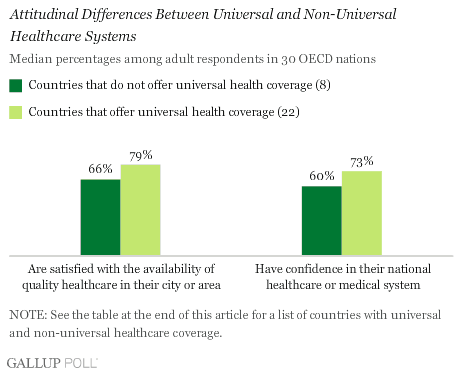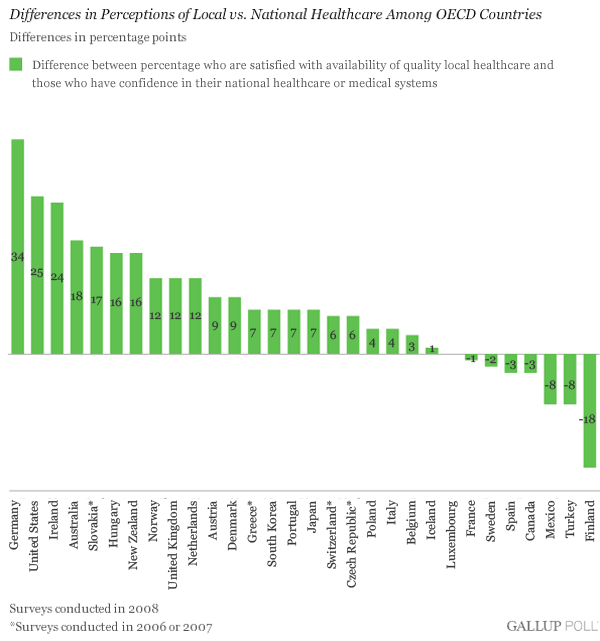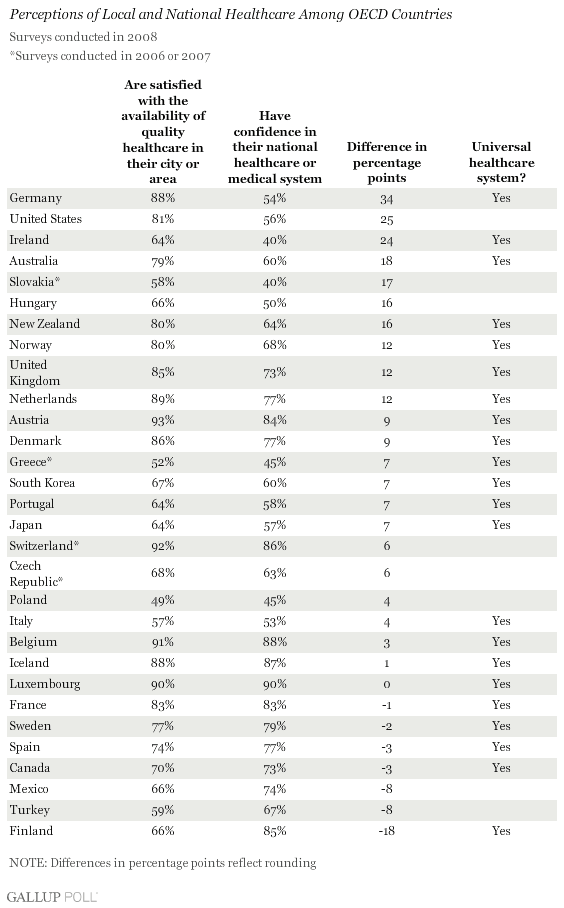WASHINGTON, D.C. -- Despite the August congressional recess, there is no escaping the debate about healthcare reform in the U.S. Gallup compared Organization for Economic Co-operation and Development (OECD) countries that offer universal health coverage with countries that do not offer it and found that respondents in countries with universal coverage are somewhat more likely to express confidence in their national health systems and satisfaction with the availability of quality healthcare in their communities.

On availability of quality local healthcare, the median percentage of satisfied respondents among countries with universal health coverage is 79%, 13 percentage points higher than the median percentage among those without universal coverage (66%). For those that have confidence in their national health system, the difference is again 13 points (73% for those with universal coverage, 60% for those without).
Overall, Gallup finds that in the United States, as well as several developed countries, respondents are more likely to be satisfied with the availability of quality healthcare in their communities than they are to have confidence in their national healthcare or medical systems, regardless of whether they have universal coverage. Among the 30 OECD nations surveyed, this gap was most pronounced in Germany, the United States, and Ireland.

Numerous factors could explain this gap in perceptions. For one, experiences with a local health provider (such as going to the doctor for a physical) are something more personal to an individual than a national health system, which is more abstract and more distant from his or her daily life. Residents' lack of confidence in the health and medical systems in their country could also signify apprehension and lowered confidence in the ability of the country, whether through public or private services, to meet the future healthcare needs of its citizens.
Gallup research has shown that in the U.S. it is fairly a standard pattern to find that people rate anything "national" less positively than the "local" version of that same topic. This holds true for such topics as government, education, and crime.
However, the pattern seen in the U.S. is not universal across OECD nations. In France and Canada, two countries that critics of universal healthcare often cite as having long wait times and high costs, Gallup finds people just as likely to be satisfied with the availability of quality healthcare in their communities as to be confident in their national health system. Gallup also found no measurable difference in several European countries, including Belgium, Luxembourg, and Sweden.
One country in northern Europe did not follow either pattern. In Finland, respondents were more likely to have confidence in their national healthcare or medical systems than they were to be satisfied with the availability of quality care at the local level. Finland, like many other European states, has a universal healthcare system and also boasts one of the lowest infant mortality rates in the world.
As the debate in the U.S. over the public health option highlights, the U.S. health system seems far from adopting universal coverage system. Respondents in OECD countries with universal coverage are somewhat more likely to be satisfied with and have confidence in local and national healthcare than respondents in countries without it. But as Gallup data show, universal coverage does not eliminate the gap in attitudes toward the availability of quality healthcare at the local level and confidence in national healthcare. It seems that even when respondents are universally covered, the concept of a national health system is an abstract, and potentially more negative, one compared with access to quality healthcare in one's community.
For complete data sets or custom research from the more than 150 countries Gallup continually surveys, please contact worldpollpartners@gallup.com or call 202.715.3030.
Survey Methods
Results are based on telephone and face-to-face interviews with at least 1,000 adults, aged 15 and older, conducted between 2006 and 2008 in Australia, Austria, Belgium, Canada, Czech Republic, Denmark, Finland, France, Germany, Greece, Hungary, Iceland, Ireland, Italy, Japan, Luxembourg, Mexico, Netherlands, New Zealand, Norway, Poland, Portugal, Slovakia, Spain, South Korea, Sweden, Switzerland, Turkey, the United Kingdom, and the United States. For results based on the total sample of national adults, one can say with 95% confidence that the maximum margin of sampling error ranged from a low of ±3.5 percentage points in Poland to a high of ±5.3 percentage points in Luxembourg. The margin of error reflects the influence of data weighting. In addition to sampling error, question wording and practical difficulties in conducting surveys can introduce error or bias into the findings of public opinion polls.

